

The third book of The Iliad brings us closer to the main characters and the centre of the whole conflict. It does this in two ways. First, is in a scene in which Helen is asked by Priam to identify key figures in the Achaean’s ranks. Second, is through the single combat between Menelaus, the Greek husband of Helen and brother to Agamemnon, and Paris, her abductor.
Having given his audience an impression of the scope of the opposing armies, and in particular the might of the Greek forces arrayed against Troy, Homer now makes the action more focussed as the battle begins. Paris emerges from the Trojan ranks for the first time, challenging soldiers in Agamemnon’s forces to fight him. Menelaus sees Paris and is thrilled at the prospect of fighting him. He leaps from his chariot to face Paris, but Paris’s courage fails and he retreats into the Trojan ranks. Hector, Paris’s brother, witnesses this retreat and is angered. His words show he sees Paris as a pretty boy who likes to impress, but has no substance or courage. He cannot understand how Paris could have so boldly taken Helen in the first place when he has no courage to back up his actions. Hector feels Paris has betrayed the honour of Troy.
Paris responds, first by saying that Hector is wrong to criticise him for his looks – “these gifts of Aphrodite” – and claims he is willing to face Menelaus in single combat. He suggest that he will be the Trojan champion, and that the result of his combat will determine the whole war. Hector approaches the Achaean lines to make this proposal. Agamemnon calls to his archers not to shoot Hector. Hector announces Paris’s challenge to Agamemnon and his troops. The outcome of the fight will determine who gets Helen and her wealth, and after that the armies will swear pacts of friendship. Menelaus accepts these terms. Preparations are made for a sacrificial feast to mark the agreement.
Meanwhile, the god Iris, looking like Hector’s sister, Laodice, goes to Helen to tell her of the halt in the conflict and the intended fight between Paris and Menelaus. Helen feels a longing for Menelaus. She leaves her room and goes to the Scaean Gate where the old men of the realm sit, watching what is happening. The old men see her and note her beauty, and understand the desire of men for her. Nevertheless, they see her as a curse and wish that she would leave Troy.
Priam sees Helen and encourages her to sit with him and identify fighters he can see in the Argive army. But Helen is in grief and she first expresses her regret that she ever came to Troy with Paris, as well as for the loss of her children, now grown up in Greece. But she identifies Agamemnon for Priam. Priam expresses admiration for Agamemnon and the might of his army.
Next, Priam sees Odysseus and Helen identifies him, saying, “he’s quick at every treachery under the sun – the man of twists and turns.” Antenor, who is father to the son who married Laodice, Hector’s sister, says he remembers when Odysseus and Menelaus first came to bargain for the return of Helen, and says that Odysseus’s looks belied his intelligence.
Helen next identifies Ajax, but notes that she cannot see Castor or Polydeuces, her brothers. Homer tells us they have already died back in Greece.
Priam is summoned to the feast on the beach by the herald Idaeus, where he is expected to agree to the terms of the contest and witness the battle between Paris and Menelaus. Priam heads to the beach where Agamemnon meets and greets him between the ranks of the two armies. Agamemnon states the terms of the contest: that the winner gets Helen and her riches and the armies will swear pacts of friendship. He also adds that the Trojans will pay reparations if Paris loses, and Agamemnon will personally enforce this condition. Agamemnon sacrifices three lambs to seal the pact.
This done, Priam announces that he intends to return to Troy. He believes Paris will lose the fight and he cannot bear to see his son killed.
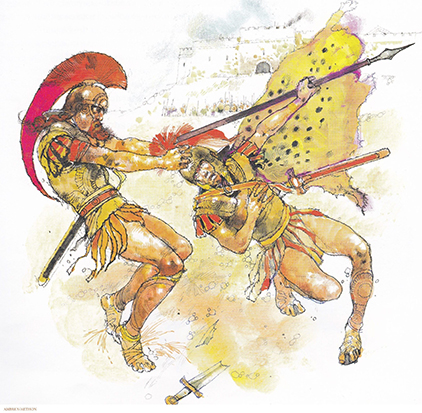
Lots are cast to see who gets to throw their spear first. Paris wins. Paris makes an elaborate show of donning his armour. Menelaus and Paris then face each other between the forces. Paris throws his spear but it fails to pierce Menelaus’s shield. Menelaus throws next. His spear pierces Paris’ shield and armour but it misses his body. Menelaus draws his sword and strikes Paris on the helmet, but his sword shatters. Menelaus grabs Paris’s helmet by its horsehair crest and swings Paris about, almost choking him. At this point, Aphrodite intercedes and spirits Paris back to his bedroom in Troy. Next, she goes to Helen and encourages Helen to go to Paris. But Helen is angry with Aphrodite, suggesting that she is treated like a puppet or a toy of the god, to be driven anywhere where it amuses her. She feels Paris has shown himself to be a coward and does not wish to return to him. Aphrodite responds angrily in turn. She threatens Helen, saying she could make Helen hated by both sides. Helen has no choice but to acquiesce and return to Paris.
But when Helen returns to Paris she expresses contempt for him. She says she wishes Paris had died in the battle and goads him to return to face Menelaus. Then her anger seems to fail her, and she tells Paris not to go back to the battle but to stay with her in the bedroom. Paris promises he will defeat Menelaus the next day. Paris is filled with desire for Helen and they make love. Meanwhile, Menelaus strides about the field of battle, looking for Paris. None of the Trojans know where he is. It is clear they would betray him if they could. Homer tells us “all of them hated him like death, black death.”
Given the circumstances, Agamemnon declares that Menelaus is the victor and demands that the terms of the agreement be honoured: that Helen and her riches be returned, and that the Trojans give them reparations for the war.
Book 3 is the first time we get to see Paris up close. Our first glimpse is of a mighty warrior:
It’s a fairly impressive description, but one that will be undermined by Paris’s actions and other descriptions of him throughout this book. Almost immediately we are aware that Homer’s descriptions of Paris become ironic, even sarcastic. Homer calls him “magnificent Paris” at the moment when Paris sees Menelaus and loses his courage. He backs into the ranks of the Trojans where he can hide from Menelaus, and Homer ends the action with another ironic appellation: “magnificent, brave Paris.” For Monty Python fans this will seem familiar, since it reminds us of ‘Brave Sir Robin’ from Monty Python and the Holy Grail, who ‘ran away’ when ‘danger reared its ugly head.’
From this point on Paris is emasculated with descriptions that feminise him – “Our prince of beauty” – or further warlike descriptions that appear ironic or focus heavily on how he looks. Hector shows contempt for Paris’s cowardice by referring to his appearance: “your long flowing locks and your striking looks”, which he calls “these gifts of Aphrodite.” When Paris is finally on the battle field, about to put on his armour to face Menelaus, Homer indulges us with twelve lines describing the armour and weapons of Paris – “magnificent Paris, fair-haired Helen’s consort” – as he prepares for the battle. Paris’s preparation is a display, while Menelaus gets to the substance of the matter in a single line: “the fighting Menelaus strapped on armour too.”
Of course, Paris is clearly losing the fight with Menelaus when Aphrodite snatches him away to safety. Aphrodite wishes to protect Paris, since he awarded her the prize for the most beautiful goddess over Athena and Hera (although this story has not been told in The Iliad, yet). That she returns him to his bedroom shows us Paris’s true nature is to be a lover, not a fighter. Even when Aphrodite forces Helen to return to him, Helen cannot maintain her anger for long, and soon after they are making love.
Book 3 is our first direct contact with Helen. She is portrayed as a deeply conflicted woman in this book. When she seats herself next to Priam she shows respect, but she openly articulates her regret that she came to Troy with Paris. She has been drawn to the Scaean Gates longing for her husband, Menelaus, who fights in front of Troy to bring her home. She feels she has betrayed him and regrets the loss of contact with her children who would now be adults. She expresses a desire for death and berates herself, calling herself a “whore”. And as she looks upon the Greek forces below them, identifying individuals for Priam, she is forced to admit that she still knows them all by heart. Helen still has deep connections with her old life.
Homer’s treatment of Helen is far more sympathetic than his treatment of Paris. Helen is self-aware, is regretful and conflicted. She is a complex character. She also has courage. When Aphrodite tries to force her back to Paris she initially refuses:
It is only when Helen is threatened with the power of the goddess to make her vulnerable to the hatred of all, that Helen acquiesces. This reveals Helen’s insecurity and weakness. Her survival relies upon a few politically powerful men. The Trojan forces have been shown to be unsympathetic to Paris and the older men of the town see her as bad luck. She cannot be sure of her fate if Menelaus recaptures her, and if Aphrodite were to turn her captors against her, she could be in danger.
Helen’s anger is initially directed at Paris when they are reunited. She calls him a coward, showing she understands how he is viewed in their society and feels the shame of that. Yet she quickly acquiesces to his seduction, suggesting she, like the men who admire her, is also vulnerable to beauty and desire.
Priam does not have a large role to play in his first appearance in The Iliad. The scene at the Scaean Gate with Helen mainly serves to remind Homer’s audience of some of the key figures in the Greek army – Agamemnon, Menelaus, Odysseus and Ajax – and to allow Helen to give him her opinion of Odysseus. The most revealing moment of Priam’s emotions comes later, when he is on the beach with Agamemnon, having just agreed to the terms of the battle between Menelaus and his son, Paris:
As a king, Priam has agreed to a pact that could save his city and people and end the war. But as a father, he is almost certainly sacrificing his son to achieve this end. His sense of the certainty of this makes Priam a tragic figure, caught in the snare of a conflict and circumstances he has no control over, with no way to resolve it except through his own grief.
Menelaus is not a particularly complex character in this book. We first see him when he espies Paris in battle, and we are privy to the excited glee he has when he realises he might fight Paris. When he fights Paris later in the book, Menelaus calls upon Zeus for his revenge. He feels wronged especially since he treated Paris as his guest before Helen was taken. When his sword shatters on Paris Helmet, Menelaus seems momentarily aggrieved rather than fearful: “Here I thought I’d punish Paris for all his outrage”. But Menelaus is a fighter (Priam has described him as loved by the god of war) and his quick action to seize Paris by the crest of his helmet is decisive, almost chocking Paris as his chin strap tightens about his throat. Our last view of Menelaus in this book, stalking around the beach looking for Paris “like a wild beast”, suggests his undiminished desire for revenge and his overbearing power and determination.
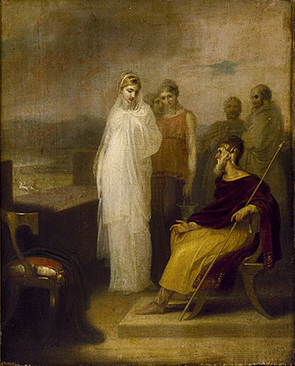
Different attitudes exist concerning Helen of Troy. In Christopher Marlowe’s play, Doctor Faustus, her spirit is summoned at the request of Faustus and it sucks away his soul. Some impressions have her as an evil temptress or a woman of low character. However, Homer’s depiction of Helen is sympathetic and I think it is captured in this 19th century painting by Richard Cook, which gives us a portrait of Helen that seems to conform with Homer’s impression in Book 3. She is quiet and respectful of Priam. The flowing fabric she wears is conservative and suggests dignity and modesty. This image focuses upon her and Priam, while the battlement of Troy renders the fighting forces below irrelevant to their scene. To me, this image suggests a shared grief between these two characters, each of whom has lost or is bound to lose people in the conflict.
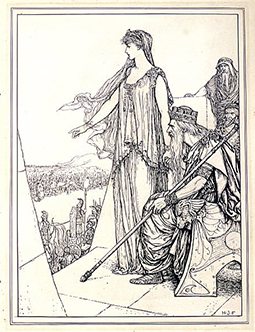
Henry Justice Ford’s portrayal of the same scene at the Scaean Gate gives us a slightly different impression. Here, Helen is informing Priam about the key figures in the Greek army whom Priam can see. Her outfit is more revealing and Helen is more sexualised in this image, with her long neck and robes that flutter towards the forces arrayed below.
The scene of Paris’s humiliation on the field of battle at the hands of Menelaus is represented in the following artworks. In Wolfgang Petersen’s 2004 film, Troy, Brendan Gleeson plays Menelaus and Orlando Bloom plays Paris. Fans of Bloom were somewhat shocked when they saw his Paris defeated so soundly and his character reduced to such abject cowardice. His character, Legolas, in The Lord of the Rings, is fearless and a formidable warrior. I think this made Paris’s humiliation that much more powerful for modern audiences.
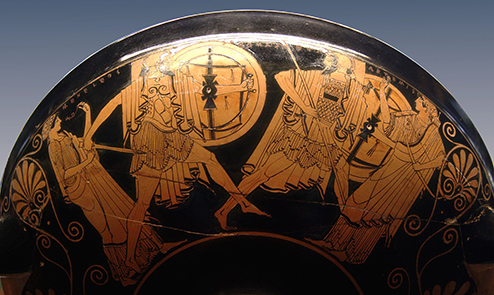
This Greek vase depicts a scene at variance with Homer’s version of Menelaus’s fight with Paris. Menelaus’s sword remains intact, and instead of pulling Paris by the helmet, Paris flees in terror. Aphrodite is portrayed here behind Menelaus, on the left. At this moment she is not intervening in the conflict. On the right we see Artemis, a goddess of the hunt. She does not appear in this scene in The Iliad.
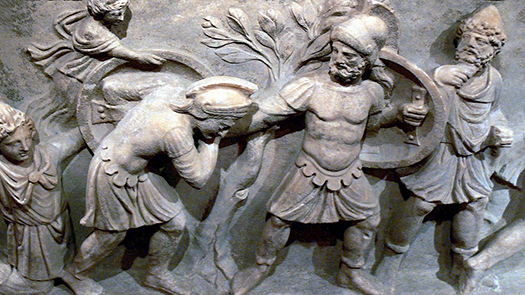
This Roman relief depicts the conflict between Paris and Menelaus at the moment when Aphrodite spirits Paris from the field of battle. This representation is the most accurate to Homer's version out ofthe four artworks covering this scene on this page, even though the artistic style reflects a Roman rather than a Greek aesthetic. The figures are not stylised or idealised, as we might expect for the subject matter.
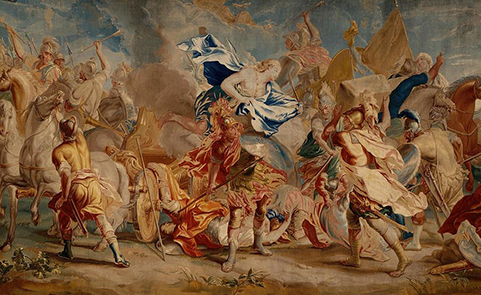
This representation by Le Brun is perhaps the least faithful to Homer's version. Menelaus, having lost his sword, appears to threaten Paris with a piece of masonry. Paris gallantly stands his ground as Aphrodite hovers above. Even less accurate is the depiction of battle around the two figures. In Book 3, Agamemnon and Priam agree to stop the fighting and let their two champions represent their armies. Their battle takes place on ground between the two armies which view the fight. I suspect Le Brun’s representation has more to do with the French Baroque style of which he was considered a master, which attempts dynamic rather than static images, often in sweeping circular motions, particularly for ceiling decorations, which are full of energy and elevating emotions.
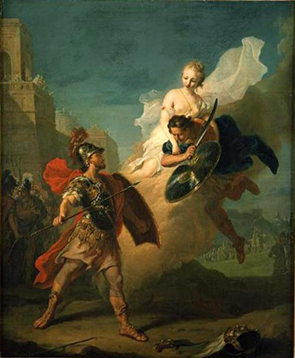
Tischbein’s painting depicts the moment that Paris is spirited away by Aphrodite. Aphrodite’s garments suggest an 18th century aesthetic. Paris is without the helmet that Homer tells us Menelaus uses to manhandle him, and he appears to strike at Menelaus, even as he is taken away, suggesting more courage than Homer credits him with.
Comments
No one has commented yet. Be the first!